If you’re a homesteader, preserving the foods you grow and harvest is very important. Preserved foods enable you to ensure you have enough supplies on hand during the winter, when your homestead will likely be less productive.
While food preservation techniques like root cellars, canning and smoking are popular options to store the food you harvest or hunt, another somewhat less common preserved food is powdered eggs.
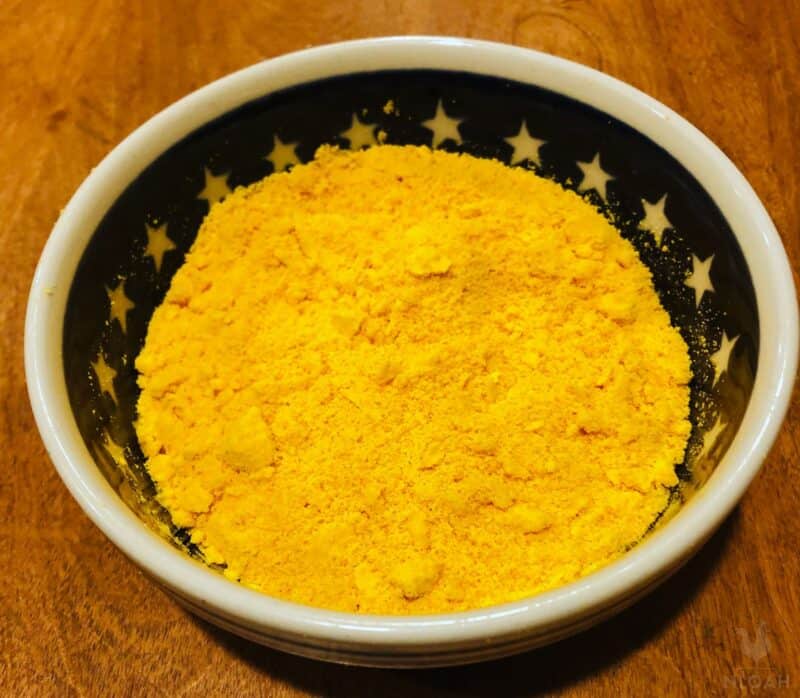
If you have a flock of chickens, you can create a safe, high-protein preserved food that will last for years, is delicious, and is great for bartering with your neighbors and other homesteaders as well.
So, if you want to learn a traditional and very effective food preservation technique, this article will show you how to make your very own powdered eggs step by step!
What Are Powdered Eggs, Anyway?
Powdered eggs are simply fresh eggs that have been cracked, beaten with a blender, then dehydrated to remove moisture into a powder. They should last a really long time, and can be used like you would real eggs.
Commercially, powdered eggs are made via a technique known as spray drying. This is a method involving atomizing liquid eggs into tiny droplets and feeding them through a large drying chamber.
There they are exposed to hot air that evaporates the water content and transforms them into solid particles – creating the powder we know today.
Of course, it’s also possible to make your own powdered eggs – and it’s far easier than you might think!
Powdered Eggs, from Beloved Camp Food to World War II Staple
Powdered eggs, sometimes called dried eggs, or dehydrated eggs, have been in widespread use for well over a century. Because a container of powdered eggs is so light and compact, it became a very popular camp food.
Hunting lodges and fishing camps relied on foods like powdered eggs and beef jerky to keep their clients well-fed while they were on excursions to the more remote parts of the United States.
Because they were so lightweight and packed with nutrients, it was not long before governments saw the utility of powdered eggs as well.
During the Second World War, when food was a critical commodity that governments controlled closely, powdered eggs were adopted widely. In the UK, dried eggs imported from the United States were distributed widely through the Ministry of Food’s ration systems, due in part to the shortage of fresh eggs.
While not as popular as fresh eggs from the farm, powdered eggs no doubt helped to keep the civilian population in the United Kingdom well-fed, so they could continue to fight the Axis Powers and win World War II.
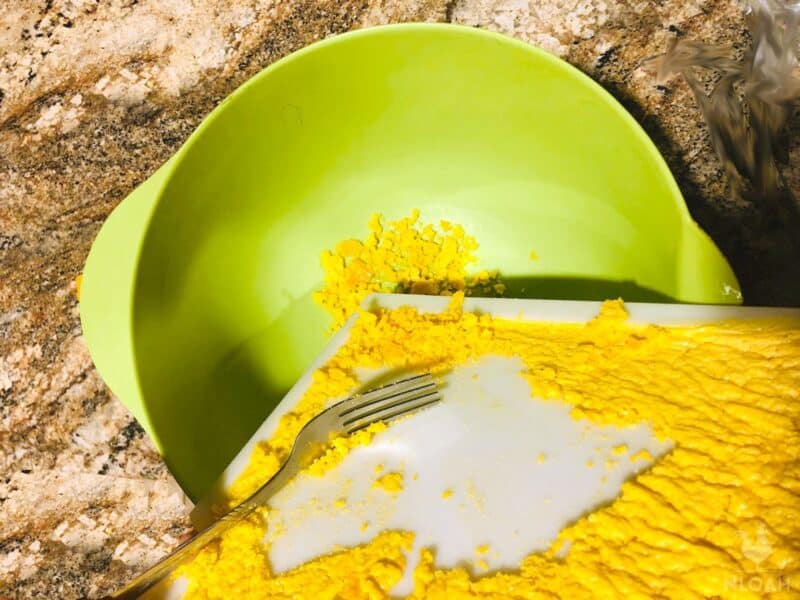
In the years following the War, powdered eggs fell out of fashion. People were no doubt happy to be free of the ration system, and the end of the War years also coincided with the beginning of mass poultry production as well.
Over the years, fresh eggs became mass-produced, inexpensive, and widely available, and powdered eggs slowly faded into obscurity.
Now, however, homesteaders are continuing to discover old skills and crafts that have become lost or obscure, and putting them to work in the 21st Century.
Interest in both homesteading as well as prepping have led many people to give powdered eggs a second look; many people even buy powdered eggs in bulk now to ensure they have a ready supply of protein on hand at all times.
However, as easy as it is to order a can or bag of powdered eggs online, it’s more practical and satisfying to make them yourself.
So, maybe it is time to give powdered eggs a try on your homestead. After all, this preserved food is a great fit for economical, sustainable, and low-cost homestead living.
Why You Should Make Powdered Eggs
If you’re a prepper, powdered eggs are great to have on hand for emergencies or survival situations as well. Here are a few of the benefits of making and using powdered eggs.
They Stay Fresh Longer
While fresh eggs may be delicious, they don’t stay fresh for long. Powdered eggs on the other hand, when stored in airtight containers in cool storage areas, can last for years. To prolong shelf life, you can also put the powder in Mylar bags with oxygen absorbers.
They Let You Make the Most of Boom and Bust Egg Laying Cycles
If your homestead is in a cold weather climate, your chickens may not lay prolifically throughout the winter; here in New England, even my hardiest cold weather hens slow down their egg laying considerably during the colder parts of the year. Making powdered eggs during the peak egg-laying months of summer will ensure you have a steady supply of eggs for your breakfast and baking needs all year long.
They’re Easy to Store
Powdered eggs are also easier to store when space is an issue, or you are hiking and want to travel light. A dozen fresh eggs take up about 122 cubic inches of space; however, their powdered equivalent only requires about 22 cubic inches.
The drying process, which we’ll discuss later, helps to kill bacteria that could have possibly contaminated eggs during handling and shipping.
Are Powdered Eggs Good For You?
Powdered eggs are also highly nutritious. A tablespoon of powdered eggs – the equivalent of one whole egg – contains over 5 grams of protein, and other essential vitamins and minerals as well.
So, now that you know a bit about the history and benefits of powdered eggs, let’s take a close look at how you can make them on your homestead.
Equipment and Ingredients
Disclosure: if you visit an external link in this post and make a purchase, I may earn a commission. Read my full earnings disclosure here.
Making powdered eggs is surprisingly simple, but you will need some basic equipment, including:
- Blender. Any standard blender will do; you’re only using the blender to mix your eggs and then ground the dried eggs into a fine powder, so it won’t get much of a workout! If you choose to do so, you can use a whisk and mixing bowl for both of these steps. However, a blender or food processor does a much more thorough job of mixing your raw eggs and rendering the dried eggs into a fine powder.
- Dehydrator. You’ll need a dehydrator to actually dry your eggs. While you could use a standard oven to dry them, a dehydrator will be much more effective and consistent. Additionally, your dehydrator can do many other important and tasty food preservation tasks as well, so it is a good tool to have on a homestead. Your dehydrator will need solid trays for you to spread out your mixed raw eggs to draw upon; these are the same types of trays used to prepare fruit leather.
- Large Mixing Bowl. You’ll need a large mixing bowl to transfer your eggs into after they’ve been dehydrated. Also, you’ll want to crack your eggs open into a bowl as well, so that you can easily remove any stray eggshells or other debris that happens to get mixed in with them.
- Storage. You’ll need something to store your powdered eggs once you make them. If you plan to consume them relatively quickly, then simple plastic locking bags or containers may suffice. However, if you intend to store your powdered eggs for months or years on end, you will need more sophisticated procedures to ensure they are packed airtight. We will discuss powdered egg storage options for your consideration later.
- Ladle or Spoon. You will use a ladle or spoon to carefully transfer your eggs from your blender onto your dehydrator trays.
- Eggs! Of course, in order to make powdered eggs, you’ll need fresh eggs to start with. This particular recipe calls for two dozen fresh eggs.
Powdered Eggs Recipe
Equipment
- Blender
- Dehydrator
- Large Mixing Bowl
- Storage
- Ladle or Spoon
Ingredients
- Eggs
Instructions
- Prepare Your Equipment. As always, ensure the equipment you are going to use is as clean as possible; after all, you are working with a food product you are preparing for potentially long-term storage. Wash and sanitize your dehydrator, dehydrator trays, your blender, and any bowls or utensils you expect to use.
- Prepare Your Eggs. Try to obtain the freshest eggs you can for this recipe. Ideally, you should gather your eggs from your homestead and prepare your powdered eggs as soon as possible. If you don’t have enough chickens to produce two dozen eggs quickly, get some more from a fellow farmer or homesteader, or buy some from a local store. Prior to proceeding to the next steps, wash any eggs you’ve gathered under warm water and wipe them off with a clean towel.
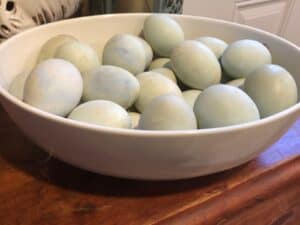
- Cracking Your Eggs. Crack your eggs into a large mixing bowl, yolks and all. Take care not to get eggshells or other materials into the bowl. If you do, use a fork to carefully fish any debris out, working the material out along the side of the bowl. Once all two dozen of your eggs are in the mixing bowl, transfer them to your blender. Then, thoroughly wash and dry your mixing bowl, and set it aside for use later.
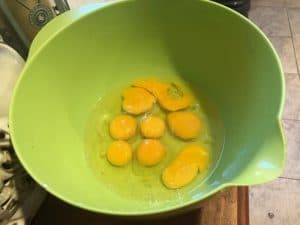
- Mixing Your Eggs. Once your eggs are in the blender, blend them at medium speed for approximately two minutes. If you have a smaller blender, you may need to blend them in two separate batches, since the egg mixture fills with air and expands a bit as you blend it all together. Once your eggs are fully mixed, you will be ready to transfer them over to your dehydrator racks.
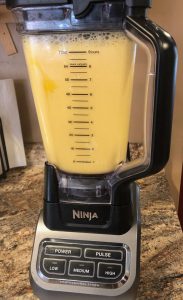
- Transfer the Egg Mixture onto the Drying Racks. I use a magic mill dehydrator, and this recipe requires me to use three to four drying racks, depending on the size of my eggs. Set out your drying racks on a table or counter and move your blender alongside them. Using your ladle, carefully transfer your egg mixture from the blender to your drying trays, taking care not to spill any in the transfer or to overfill the trays.
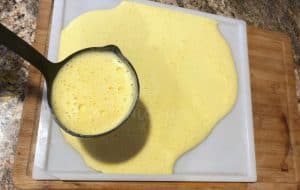
- Once each tray is filled, load the racks into your dehydrator, taking care not to tip a tray and spill your egg mixture everywhere. Wash and dry your blender as soon as you are done transferring your mixture, you will need it to render your dried eggs into powder later on.
- Dehydrate Your Egg Mixture. Consult your dehydrator manual to determine exactly how long it takes to dehydrate your egg mixture. I dry my egg mixture at a temperature of 149 degrees Fahrenheit (65 Celsius) in the dehydrator for 5 to 7 hours. However, each brand of dehydrator is considerably different, so consult your manual for the proper settings.
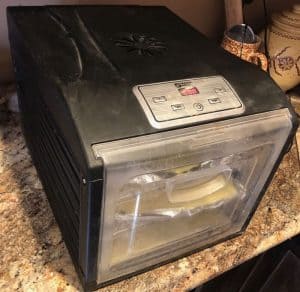
- After your egg mixture has dried for the prescribed time, remove and inspect them. If they are thoroughly dry, they should be slightly browned on top, cracked and brittle. If the eggs seem moist or soft, place them back into the dehydrator to dry some more.
- Once they are fully dried out, scrape your eggs off of each tray with a fork or butter knife carefully into your mixing bowl.
- Rendering your Dried Eggs into Powder Once you’ve removed all of your dried eggs from your blender into your mixing bowl, load them all into your blender. Then, on a medium setting, blend the dried eggs until they are completely rendered into a fine powder. Once the blending is complete, you are ready to store or use your powdered eggs!
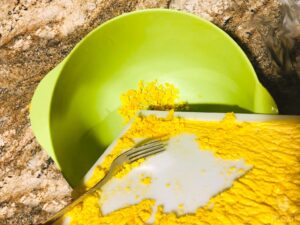
Notes
- If you have a compost pile, you should collect up all of the eggshells, smash them up, and then add them to the pile.
Packing and Storing Powdered Eggs
If you plan to use your powdered eggs relatively quickly, you can simply store them in a locking plastic bag in your refrigerator. However, if you intend to store powdered eggs for months or years at a time, you should definitely take additional measures.
One great option to safely store your powdered eggs for the long term is to use a vacuum seal machine to pack your powdered eggs into an airtight plastic bag.
Once you have vacuum packed your eggs, store them in a cool dry place that is out of direct sunlight. Once you’ve opened any of your vacuum-packed powdered egg bags, ensure you store them in a refrigerator.
Another option for storing powdered eggs is in mason jars. Not only do they offer a neat and tidy way to store them, but they provide you with an airtight seal that will help to keep them fresh for longer periods of time. It’s easy to see what’s inside so you can use up your powdered eggs ASAP.
You can learn more about powdered eggs and food safety from the USDA website. Additionally, here is a great video that demonstrates how vacuum packing is used for food preservation and storage, especially for powdered goods:
Cooking with Powdered Eggs
Once you have plenty of powdered eggs on hand, you will be ready to start using them for breakfast and for recipes that call for eggs.
To cook your powdered eggs into scrambled eggs, one tablespoon of powder and two tablespoons of water approximates one egg. Simply mix the egg powder and water together, then add to a skillet and cook the mixture over medium heat for a plate of scrambled eggs.
Here is a video demonstrating how to cook reconstituted powdered eggs in a skillet:
You can also use your powdered eggs in lieu of fresh eggs for recipes requiring eggs, such as cake. Simply use the 1:2 powder-to-water ratio to add the appropriate amount of powder and water for any given recipe.
Of course, dried eggs will make a tasty omelet every time…
You DO NOT have to mix the egg powder and water prior to adding them to a given recipe, either. Simply add the proper amount of egg powder and water separately to a mixing bowl with the other ingredients the recipe calls for, so that you approximate the amount of eggs the recipe calls for.
Parting Thoughts
If you’re looking for innovative ways to preserve food on your homestead, you should definitely consider making powdered eggs.
Powdered eggs are packed with protein and other nutrients and are easy to make and store. Plus, they are absolutely delicious as well. So, follow the directions here, and add some powdered eggs to your pantry today!
Powdered Eggs FAQ
If stored properly, powdered eggs will last anywhere between 5 and 10 years.
Most people agree that powdered eggs have their own unique flavor that is pleasantly close to the look and feel of cooked-down real eggs (when simmered with some oil or butter).
Yes, powdered eggs are an excellent substitute to fresh eggs to bake cakes, bread, biscuits and, oh, so much more!
Of course, powdered eggs are real eggs! That’s what they’re made of, and fresh eggs are their one and only ingredient!
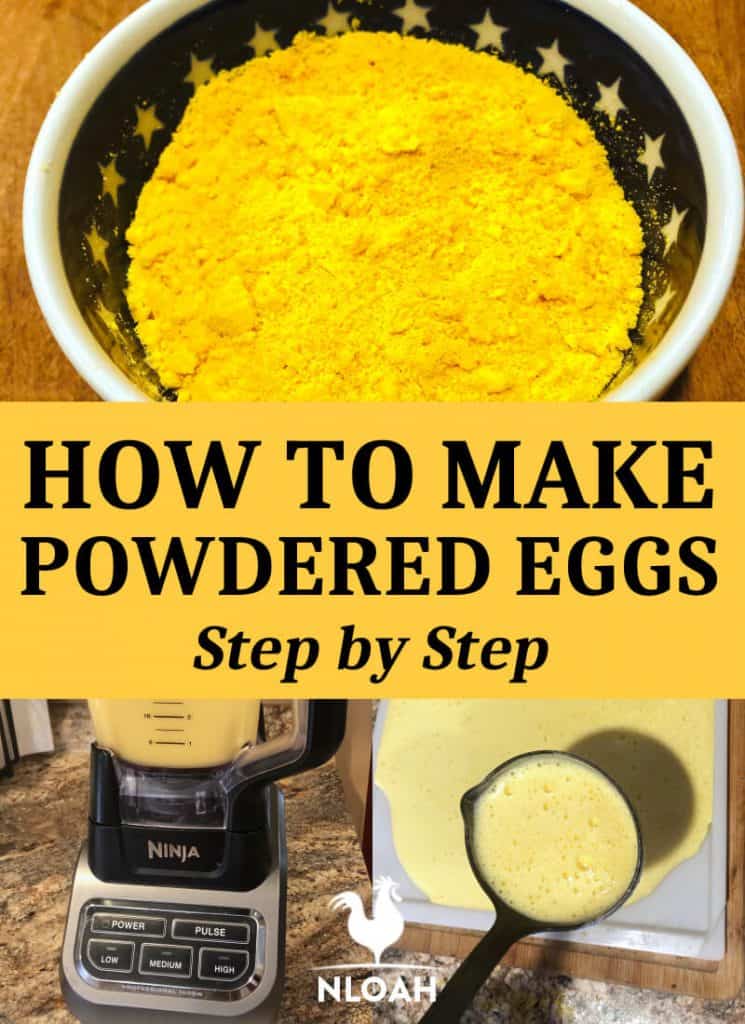
When Tom Harkins is not busy doing emergency repairs to his 200 year-old New England home, he tries to send all of his time gardening, home brewing, foraging, and taking care of his ever-growing flock of chickens, turkey and geese.

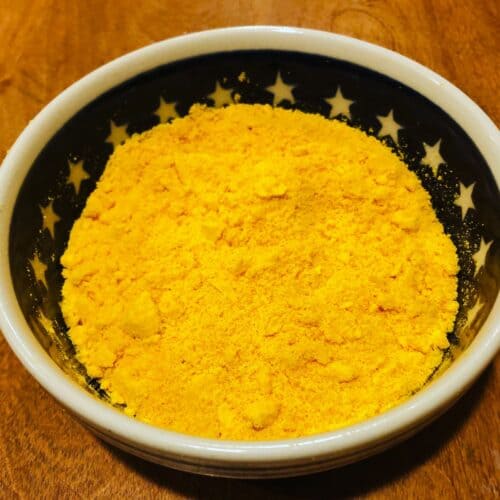
Stored powered dehydrated egg in mason jars. Seal was compromised. Are they safe and can I reseal? I did have band on it with lid? thank you
I’m a newbie, I tried this recipe and thought some additional notes would be helpful. When you are blending your raw liquid eggs you want the whole blender full to be frothy. Let it sit for a min or two after blending and if liquid settles at the bottom, you need to blend longer.
My blender might not be the best, and I might have done a thicker layer than she did so my powder was a bit chunky after blending for a while. It really needs to be a fine powder or you’ll be chewing chunks in your eggs. I found if I did small batches in a coffee grinder/spice grinder it turned out perfect.
I think I’ve got it down pat now and really appreciate the recipe.
Thanks for sharing your thoughts.?
For storing the egg power in jars, do the jars need to be either pressure-canned or water bath canned, or simply sanitizing the jars and lids beforehand?
I love using powdered eggs to make a large container of homemade pancake mix; just measure out dry, add your water or milk and viola easy go to breakfast, lunch or supper. TY for the recipe powdering your own
Question: I would like to subdivide my powdered eggs by weight. That way, if my bag of eggs weigh X amount, I know I have X amount of eggs there. For example, 2 lbs of powdered eggs is commonly sold by groups like Augusta Farms, but just many eggs is that?
So, 1 tablespoon is 1 egg right? What does a tablespoon weigh? What does 1 dozen powdered eggs weigh?
Thanks!
You might need to get a scale to do what you’re trying to do. I doubt 1 tablespoon always equals 1 egg, and the weight of the dried powder (mass, really) is likely not going to be consistent.
In most industrial methods, the dried eggs are produced en mass, enormous batches, and homogenized, to produce a consistent product.
You probably won’t have that luxury at home, so I’d recommend getting a reliable scale.
How about using dried eggs in smoothies in place of protein powder? Are they still “raw”, or are they safe to be consumed?
The eggs are still raw and need to be cooked.
Would it be the same for egg yolks?
What if we do t have a dehydrator?
It’s definitely worth getting one. I put off buying one for a while… It’s been in constant use since I bought it. I’ve been making Jerky, fruit leathers, drying herbs, veg (including mashed potato), fruit, fresh pasta, eggs etc.
Also, buy a Vacuum sealer, they are also worth their weight in gold.
I second the vacuumed sealer, my mom gave me her old one, even if you’re not prepping it can be great for buying meats in bulk while they’re on sale to save money!
I just purchased a freeze dryer (HarvestRight, which is the only home-use freezer dryer on the market at this time) and am doing this with my abundance of farm-fresh chicken AND duck eggs. Hubby is looking at me like I’m crazy, and I said this to him… “knowing what is coming, I’m preparing for it”. We just got the freeze dryer in a week ago, and I’ve already got several Mason jars full of eggs, 18-count per jar. I’ll be transferring them to mylar bags that can be sealed but have reclosable ziplock seals, later this week when I get them in.
Hi, how has the Freeze dryer been working out for you? Am thinking to buy one or just use my dehydrator.
Thanks for this! I want a Harvest Right but goodness they’re expensive. ?
Thanks very much!
Can I do this in a power xl pro air fryer?
Please help me , where do your get Dehydrator that you use this training, because I noticed that you using trays to spread eggs on it.
We don’t have that kind of tray for our dehydrator so we blended them, then scrambled them with NO oil, butter or grease. Eggs only! Then we loaded the solid eggs onto the dehydrator. I know it takes less time to dehydrate that way but I can’t remember how long it took. Just follow the directions in here to know when they are finished.
Makes sense! Thanks!
Are you able to use the precooked eggs in baked goods? Seems like a silly question. But I can’t seem to find the answer….
No, they would only be good as scrambled eggs as the protein has denatured to its solid form,as opposed to moisture removed and protein stay in original form but in a solid, but reconstitutable form.
I don’t believe that they will bind as they should, just a guess
Can you use cooked eggs, In recipes though? For instance, will they bind bread or cake?
Thank you!
Thank you for sharing!